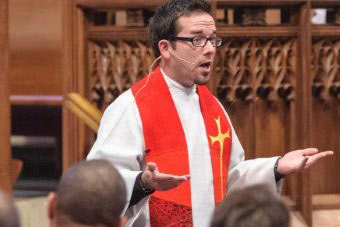Radical welcome meets sacred hospitality: Jason Chesnut on digital ministry in a new era

Jason Chesnut (2010, MDiv) would be the first to admit that his work may sound unfamiliar to those committed to traditional ways of reaching congregations.
“I’m not cut out for parish ministry,” Chesnut says, “and that’s OK.” It’s more than OK; what Chesnut is cut out for is just as impactful. In fact, his work as a digital pastor and storyteller resulted in him being awarded the Distinguished Alumni Award in the category of “Witness to the World” at LSTC’s Homecoming in October.
When it comes to bearing witness, which he defines as embodying a “non-judgmental, non-authoritarian grace-filled presence,” Chesnut has years of experience. He recalls his days in Baltimore, where he’d choose the most people-filled unglamourous spots he could find (bus stops were popular) to sit with a sign that said, “Christianity Without the Crap.” He’d hand out free water and invite conversations with passersby. It was a way to talk about faith with those who might be skeptical of impending judgment.
“As a white man and white person … we have to de-center ourselves and our experiences,” Chesnut says. “We have to learn to listen.” For Chesnut, some of this work can be done in-person, the way he did on the streets of Baltimore, and the way that he did during his first call in 2010 in Wisconsin. But it can be done in other ways, too.
Chesnut doesn’t wait for people to come to him. Instead, he goes out and finds them. Today, many of those people can be found not in a church, but online. During his second call, in Baltimore, Chesnut started The Slate Project, a ministry of the Delaware-Maryland Synod (and other partners) dedicated to eliminating “racism, sexism, homophobia, transphobia, classism, xenophobia, colonialism, patriarchy, anti-Semitism, Islamophobia, and disrespect for other religions.” It’s a ministry driven by radical inclusion and transformational conversations. It is also about bearing witness to the hard, painful pieces of our lived reality and working together to help each other.
For Chesnut, working in film and digital storytelling is another way to access important stories that need to be shared. He does this through his production company ANKOSfilms, which works with churches, cultural organizations and private citizens to tell stories that might otherwise go untold. The goal: “to create spaces largely digital (but sometimes face-to-face) that are wide enough to make people feel safe and comforted–but also challenged–to experience the divine … maybe in a way they haven’t before.” From stories celebrating congregations like Holy Family Lutheran Church in Chicago, to pieces shining light on the plight of asylum-seekers at the México-U.S. border, to work capturing the artistry of slam poets, ANKOSfilms bears witness to the human experience.
Chesnut receives the alumni award for both past ministry and all that is to come. He and classmate Tim Brown (2009, MDiv) have launched “Anam Cara,” a Gaelic phrase that means “soul friend,” as an online mission development in the North Carolina Synod.
As he continues to “witness to the world,” Chesnut’s ministry advice is to come to conversations with an open ear and contrite heart, and “Listen as much as you can. And if you feel uncomfortable, listen specifically to that voice. Embrace discomfort.”
By Rhiannon Koehler, a writer, editor and content director in Chicago.